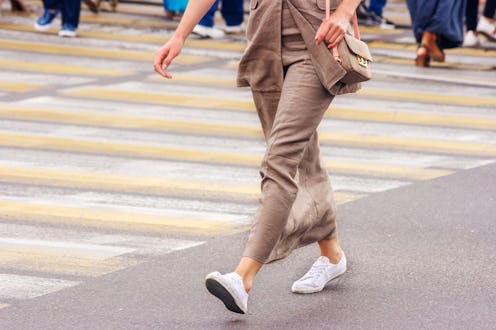
If your friends complain that you walk too fast, you can now officially tell them to buzz off, because the health benefits of walking increase if you're a fast walker. According to a new study of over 50,000 adults published in the British Journal of Sports Medicine, walking fast versus sauntering slowly can reduce mortality rates by up to 24 percent. If you're not sure what's considered fast, lead author of the study, Professor Emmanuel Stamatakis from the University of Sydney’s Charles Perkins Centre and School of Public Health, said on the school's news site that a productive fast walk should leave you slightly out of breath — which, if you've ever tried to swerve around tourists clogging the sidewalk in your city, you'll relate to all too well.
"Assuming our results reflect cause and effect, these analyses suggest that increasing walking pace may be a straightforward way for people to improve heart health and risk for premature mortality," Stamatakis explained. "Especially in situations when walking more isn’t possible due to time pressures or a less walking-friendly environment, walking faster may be a good option to get the heart rate up — one that most people can easily incorporate into their lives."
If slow walkers make you totally bananas, feel free to let them know that speeding up can help them live longer. If that doesn't prompt them to pick up the pace, tell them that being a speedy walker means they can get places faster, which can save them some valuable time. Seriously, the benefits of speedy strutting are endless, and it's time to put those getaway sticks to work for you.
One of the reasons so many people get annoyed with slow walkers is because they feel like slowpokes are wasting their time. "The link between time and emotion is a complex one. A lot is dependent on expectation — if we expect something to take time, then we can accept it," James Moore, a neuroscientist at Goldsmiths, University of London, told Big Think. "Frustration is often a consequence of expectations being violated."
Basically, if you can get to work in 10 minutes walking at a fast clip, people sauntering slowly on the sidewalk can violate your expectation of how long your morning walk should take. While slow walkers aren't clued into your schedule, and they're not intentionally trying to make you late, it can still be wicked frustrating to get stuck behind a gaggle of people taking up the entire sidewalk.
Instead of getting angry at the people taking the time to stop and smell the roses, you can cling to the knowledge that even though you may be smelling fewer flowers, you have a 24 percent chance of living longer. And, smelling too many flowers can aggravate your allergies, so it's really not that much of a sacrifice to speed walk past the botanical gardens.
What's more, if you don't have time for regular exercise, walking fast to get to where you're going can be just as beneficial as spending time on the treadmill going nowhere. While this most recent study found that fast walking reduces overall mortality rate, the Independent reported that another study by researchers from the University of Leicester in England found that slow walkers are twice as likely to die from heart disease.
From wine to chocolate to green tea to sleep, a lot of things have been touted as the fountain of youth. Walking is something you already do anyways, and if you are physically able to walk quickly, picking up the pace is an easy way to increase your chances of living long enough to witness humans living on the moon and to drive those flying cars the movie Back to the Future promised we would have by now. Walking fast means you can also sleep a few minutes longer, or have extra time for whatever strikes your fancy. And, let's be honest, anything that gives you more time is pretty boss.